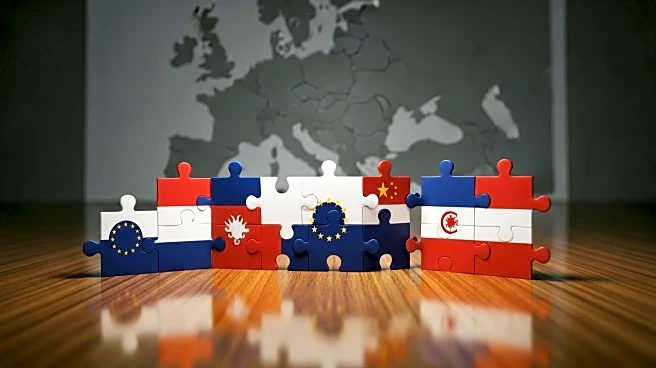What's Happening?
Leaders from the Western Balkan countries convened in Golem, Albania, to reaffirm their commitment to European Union integration. The meeting, part of the Brdo-Brijuni Process initiated by Slovenia and Croatia, aims to support EU enlargement in the region, which includes Albania, Bosnia, Serbia, Montenegro, North Macedonia, and Kosovo. The leaders issued a joint declaration emphasizing their shared vision for a peaceful, stable, and prosperous Europe. The EU's willingness to accept new members has increased since the onset of the Ukraine war, raising concerns about potential spillover into the Balkans. The gathering was led by Albanian President Bajram Begaj, Slovenian President Natasa Pirc Musar, and Croatian President Zoran Milanovic.
Why It's Important?
The commitment to EU integration by the Western Balkan countries is significant as it represents a strategic alignment with European values and stability, especially in light of ongoing geopolitical tensions. The region's integration into the EU could enhance economic growth, political stability, and security, reducing the risk of conflict. The EU's openness to new members is partly driven by the need to counter Russian influence in Eastern Europe. Successful integration could lead to increased investment and development in the Balkans, benefiting both the region and the EU.
What's Next?
The Western Balkan countries are at different stages of EU membership, with Montenegro and Albania leading the process. The EU's 6 billion euro growth plan aims to advance reforms in the region. Slovenian President Natasa Pirc Musar has urged the EU to expedite the integration process, citing security and peace in Europe as critical factors. Continued diplomatic efforts and reforms are expected to be key in advancing the region's EU membership aspirations.
Beyond the Headlines
The Brdo-Brijuni Process seeks to promote reconciliation and political dialogue in a region still affected by past conflicts. Tensions, such as those between Serbia and Kosovo, remain a challenge. The initiative underscores the importance of diplomacy and cooperation in achieving long-term peace and stability.









